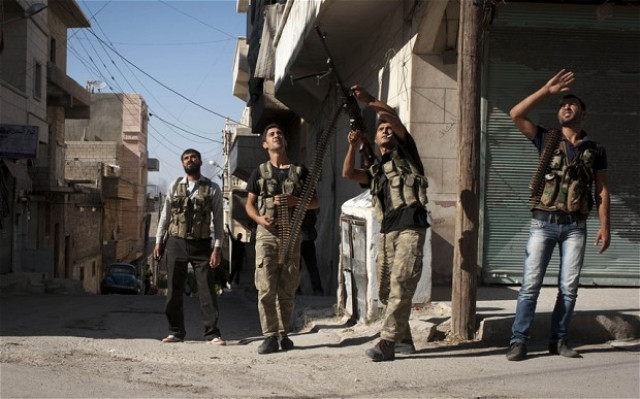Turkey, US officials in first operational meeting on Syria
Turkish and US officials held their first meeting aimed at bringing about the end of Syrian President's regime.

The meeting was expected to coordinate military, intelligence and political responses to the crisis in Syria where a deadly crackdown on peaceful protests that began in March 2011 has according to activists claimed over 23,000 lives.
The officials were also due to discuss contingency plans in the case of potential threats including a chemical attack by Assad's regime which Washington has said would be a "red line".
Turkish foreign ministry deputy under-secretary Halit Cevik and US ambassador Elisabeth Jones led the delegations made up of intelligence agents, military officials and diplomats at the Ankara meeting, a foreign ministry source told AFP.
The meeting began at 0800 GMT and lasted for eight hours, but no press statement was issued after the closed-door talks.
State Department spokeswoman Victoria Nuland, however, said that the Ankara talks looked at the transition to a post-Assad Syria along with ways to support the opposition and to handle refugees.
"This is designed to go deeply on the full range of contingencies that one might confront," Nuland told reporters in Washington.
"And we are looking at every feasible option in terms of what we might do together to evaluate whether it'll advance our shared goal of hastening the transition or not," she said, declining to provide further details.
US Secretary of State Hillary Clinton and Turkey's Foreign Minister Ahmet Davutoglu had announced their plans for such a mechanism to hasten the end of President Bashar al-Assad's regime on August 11 in Istanbul.
Thursday's meeting came just days after US President Barack Obama warned Syria that any movement or use of its chemical weapons would be a "red line" that would change his perspective on how to respond to the conflict.
A chemical attack would also trigger a refugee influx to neighbouring countries including Turkey which is already hosting more than 70,000 Syrians, as well as the rebel leadership.
Nuland did not say whether the Ankara talks discussed the potential use of chemical weapons, a prospect that has raised growing global concern.
"But with not just Turkey but all of our allies and partners, we are obviously doing appropriate thinking and contingency planning in case we confront a situation where Assad makes a terrible and horrific choice," she said.
In a post-Assad Syria, "the international community will want to offer the Syrian people support for managing and disposing of some of the most dangerous weapons of the Assad regime," she said.
On Monday, Davutoglu said Turkey could handle no more than 100,000 Syrian refugees and proposed setting up a UN buffer zone inside Syria to shelter them.
The growing flow of refugees amid fierce fighting in the northern city of Aleppo between regime forces and rebels has raised fears of a repeat of the 1991 Gulf War, when half a million Iraqi Kurds massed along the common border.
The UN Security Council will debate the humanitarian situation in Syria on August 30 at a ministerial level meeting.
UN emergency relief coordinator Valerie Amos said Wednesday however that despite the increasingly precarious humanitarian situation, UN Security Council divisions would prevent the creation of any safe havens in Syria.
The Security Council has failed to act decisively to try to end the Syrian conflict, hampered by rifts between the West and Syria's traditional allies China and Russia, particularly over Assad's fate.
The threat of armed groups including the outlawed Kurdistan Workers' Party (PKK) and al Qaeda which could exploit a power vacuum in Syria was also expected to be high on the agenda of the Ankara meeting.
In Istanbul, Clinton had said she shared "Turkey's determination that Syria must not become a haven for PKK terrorists whether now or after the departure of the Assad regime."
The growing presence in northern Syria of the Kurdish Democratic Union Party (PYD), affiliated with the PKK blacklisted as a terrorist organisation by Turkey and the United States, has alarmed Turkey which has lined its border with tanks and missile launchers.
Turkish officials fear the chaos in Syria would be utilised by Kurdish fighters who have recently intensified their attacks inside the country also targeting civilians.



















COMMENTS
Comments are moderated and generally will be posted if they are on-topic and not abusive.
For more information, please see our Comments FAQ